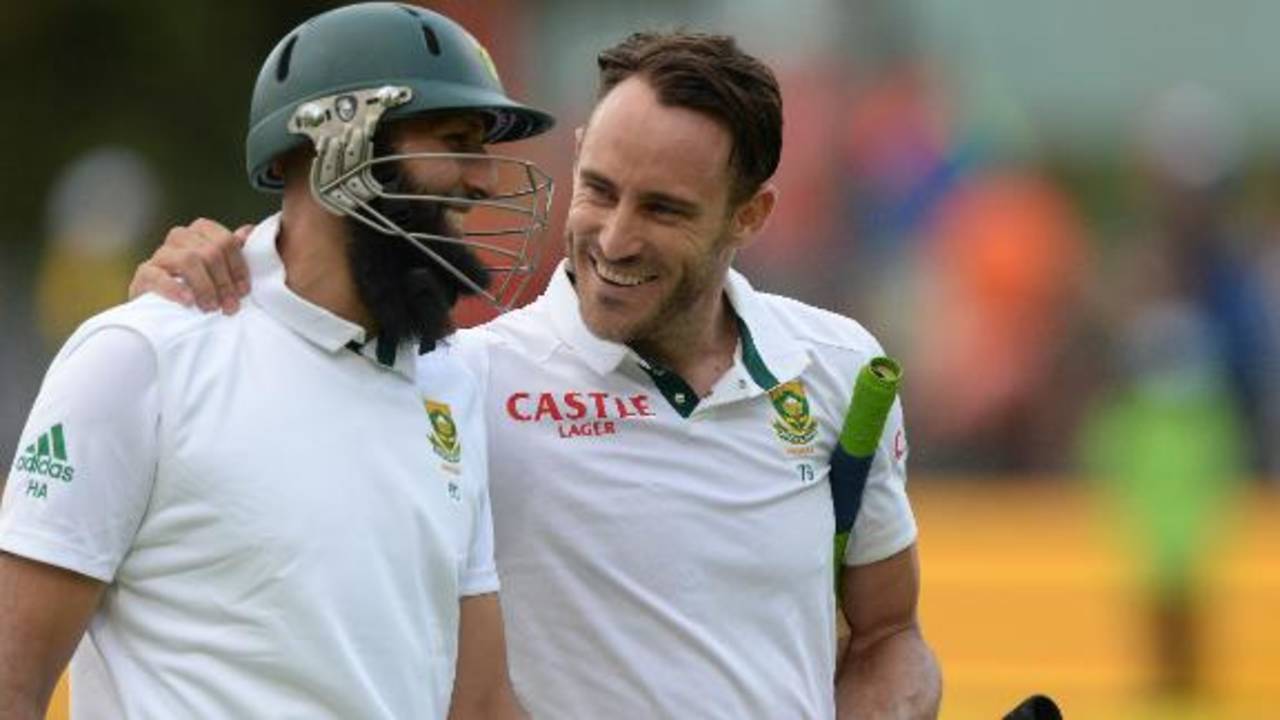South Africa achieve smooth batting transition
Although South Africa lost a home series to Australia after Jacques Kallis retired, they are unbeaten under the new captain Hashim Amla and have been successfully introducing new batsmen into the side, sans the stumbling other squads go through
Firdose Moonda in Port Elizabeth
23-Dec-2014
From the Summerstrand beach in Port Elizabeth to the Sea Point promenade in Cape Town, the sea looks pretty much the same: sparkling blue and sprinkled with sunlight. Sight alone cannot tell you that one is the warm Indian Ocean, the other the icy Atlantic. And when you visit the point where the two merge, the gentle slap of one wave over another will not convince you that water has a border. It simply flows into itself, like any good transition, especially the one the South Africa team is currently experiencing.
It has only been a year and seven Tests since Jacques Kallis retired and nine months and four Tests that South Africa have been without Graeme Smith but the twin departures have not dented the team as severely as the loss of 283 Test caps and 30 years of collective experience should. Although South Africa lost a home series to Australia after Kallis retired, they are unbeaten under the new captain Hashim Amla and have been successfully introducing new batsmen into the side, sans the stumbling other squads go through.
Of South Africa's last six Test debutants dating back to November 2012, four have been batsman, starting with Faf du Plessis. He has already made notable enough performances to be considered a senior and attributes that to a welcoming set-up. "The most important thing for a new guy is the environment and this is the best environment you can ask for," du Plessis said. "Straight away you feel like someone who belongs. You don't feel like a junior player who has to score three hundreds before you get accepted."
South Africa have developed a system of identifying the players they believe are close to playing Test cricket and including them in the squad early and du Plessis is proof it works. He traveled to England in 2012, when South Africa took the Test mace off England. Later that year in Australia, he debuted in Adelaide and saved the game.
Dean Elgar was the next reserve and made his first appearance in Perth in the game after du Plessis' debut, where he suffered a pair. He played eight Tests out of his preferred opening position before being moved up on Smith's retirement and his example proves that South Africa are willing to persist with the players they've picked.
"Even you if you look at Rilee Rossouw, he didn't have the best start to his ODI career but we all backed him and if you have that, it's more important than anything else," du Plessis said. Rossouw scored four ducks in his first six ODI innings but remains very much in South Africa's plans and was even brought into the Test squad when Quinton de Kock was ruled out of the West Indies series.
De Kock's injury means it "looks likely," according to du Plessis, that the next batsman in the squad could debut at St George's Park because South Africa are unlikely to deviate from the strategy of seven specialist batsmen. Temba Bavuma was the reserve when the squad was first announced and if South Africa follow their pattern of promotion, he will play ahead of Rossouw.
Although Bavuma is a regular No. 3, he will likely be deployed in the lower-middle order where South Africa's debutants have featured. They arrive after players such as du Plessis, Amla and AB de Villiers which should mean they are shielded from the early assault of the opposition attack. But they may still face a second new-ball, which du Plessis explained can be difficult to negotiate on South African surfaces. "The new ball offers challenges. It's important to be really tight. Once you get through that, that's when you can score the big runs and so when you get in, you have to make sure you convert."
Stuttering after a start was the theme of the West Indies top-order at Centurion and has also become a trend for one of South Africa's openers, Alviro Petersen, who has been dismissed under 35 in 19 of his last 24 innings. If he can put that right, du Plessis hinted that South Africa could post a total even higher than the 552 for 5 declared they made in Centurion.
"We've got a batting line-up that becomes really dangerous when we don't lose wicket upfronts. We saw in Centurion, West Indies had a sniff with the three early wickets but then we had a big partnership and we blew them away."
Personally, du Plessis is hoping to make a contribution on the ground where he scored his first home hundred, in January 2013. "In the previous innings, I got a good ball. That happens to everyone but I am looking forward to playing here again."
Firdose Moonda is ESPNcricinfo's South Africa correspondent
